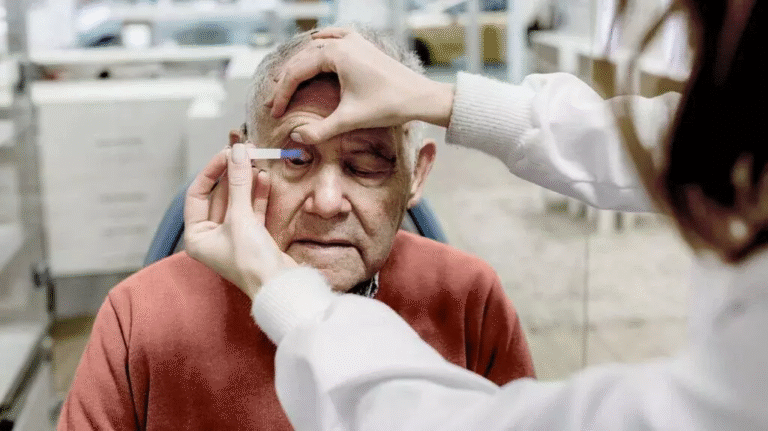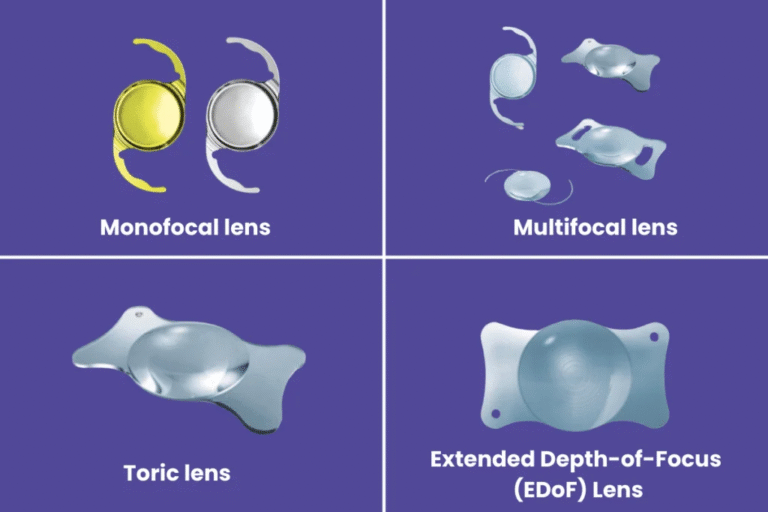Cataract surgery & Aging: What seniors should know?

As we grow older, changes in our body are inevitable—and our vision is no exception. Cataracts are one of the most common age-related eye conditions, affecting more than 80% of people over the age of 60 in India. While the idea of losing vision may be frightening, the good news is that cataract surgery is one of the safest and most effective procedures available today.
In this guide, we’ll walk you through everything seniors and their families need to know about cataract surgery—why it happens, when to consider surgery, what to expect during the procedure, and how life can dramatically improve afterward.
Table of Contents
ToggleWhat are cataracts?
A cataract is the clouding of the eye’s natural lens, which lies behind the iris and pupil. As the lens becomes cloudy, vision becomes blurry, colors lose their vibrancy, and bright lights may seem glaring or uncomfortable. Cataracts typically develop slowly, and symptoms can worsen over time if left untreated.
Why do cataracts develop with age?
Cataracts are primarily age-related. As we age, the proteins in the eye’s lens begin to break down and clump together, forming cloudy patches. Over time, these patches spread and cause significant visual impairment.
Common causes of age-related cataracts:
- Natural aging process. (most common in 45+ age group)
- Long-term exposure to UV radiation.
- Diabetes or other health conditions.
- Smoking or alcohol use.
- Prolonged use of corticosteroids.
- Eye injuries or surgeries.
Symptoms of cataracts in seniors
Early signs may go unnoticed, but as cataracts progress, you may experience:
- Blurred or cloudy vision.
- Glare or halos around lights.
- Poor night vision.
- Faded or yellowed colors.
- Frequent changes in glasses prescription.
- Double vision in one eye.
When should seniors consider cataract surgery?
If cataracts begin to interfere with your daily activities—like reading, driving, or watching television—it may be time to consider surgery.
Signs it’s time to consult an eye specialist:
- Trouble with reading or doing household tasks.
- Difficulty recognizing faces or navigating stairs.
- Feeling unsafe while driving at night.
- Reduced quality of life due to poor vision.
What happens during cataract surgery?
Cataract surgery is a quick and virtually painless outpatient procedure that takes about 10 to 15 minutes per eye. Here’s what to expect:
Step-by-Step overview:
- Pre-operative evaluation – Your eye will be examined, and measurements will be taken to select the best intraocular lens (IOL).
- Local anesthesia – Usually via eye drops; you will remain awake but feel no pain.
- Phacoemulsification – A tiny incision is made, and the cloudy lens is emulsified (broken up) using ultrasound.
- Lens implantation – A clear, artificial intraocular lens (IOL) is inserted to replace the removed natural lens.
- Post-op care – You’ll rest briefly and then go home with instructions and eye drops to aid healing.
Types of Intraocular Lenses (IOLs) available
Seniors today have the advantage of choosing from various advanced lens options:

- Monofocal IOLs – Clear vision at one distance (usually for distance).
- Multifocal IOLs – Clear vision at near, intermediate, and far distances.
- Toric IOLs – Correct astigmatism along with cataracts.
- EDOF (Extended Depth of Focus) IOLs – A newer option offering enhanced range and reduced need for glasses.
Your ophthalmologist will help you choose the best lens based on your lifestyle and eye health.
Recovery after cataract surgery
Most seniors report clearer vision within a few days of the surgery, although complete healing may take 2–4 weeks
Recovery tips:
- Avoid rubbing or pressing your eye.
- Use prescribed eye drops regularly.
- Wear protective eyewear as advised.
- Avoid strenuous activity, bending over, or heavy lifting for a few days.
Life after cataract surgery: What seniors can expect
Cataract surgery is often life-changing. After healing, seniors typically experience:
- Sharper, brighter vision.
- Better color perception.
- Improved confidence and mobility.
- Greater independence in daily activities.
- Reduced risk of falls and injuries.
When to schedule an eye exam?
Even if you’re not experiencing severe symptoms, regular eye exams after age 50 are essential. Visit an eye specialist if you notice:
- Blurry or cloudy vision.
- Light sensitivity.
- Trouble seeing at night.
- Rapid changes in vision.
- Visual disturbances like halos or glare.
Early diagnosis can prevent complications and help you decide the right time for surgery.
Conclusion
Aging may be inevitable, but vision loss from cataracts doesn’t have to be. With today’s advanced surgical techniques and lens options, seniors can regain independence and enjoy a vibrant, active lifestyle once again.
At Krisha Eye Hospital, we specialize in advanced cataract care with a patient-first approach. Our experienced surgeons, state-of-the-art equipment, and commitment to safety ensure the best outcomes for every patient.
Don’t let cloudy vision cloud your life. Book your consultation today and see the world clearly again.
Author bio
Dr. Dhwani Maheshwari, an esteemed ophthalmologist with over 10 years of experience, leads Krisha Eye hospital in Ahmedabad with a commitment to advanced, patient-centered eye care. Specializing in cataract and refractive surgery, Dr. Maheshwari has performed more than a thousand successful surgeries. Her expertise lies in phacoemulsification, a technique recognized for its precision in cataract treatment.
Dr. Maheshwari’s educational journey includes an MBBS from Smt. NHL MMC, a DOMS from M & J Institute of Ophthalmology, and a DNB in Ophthalmology from Mahatme Eye Bank Eye Hospital, Nagpur. She also completed a fellowship in phacoemulsification at Porecha Blindness Trust Hospital, further enhancing her surgical skills. In addition to her work at Krisha Eye Hospital, Dr. Maheshwari serves as a consultant ophthalmologist at Northstar Diagnostic Centre.
Under her leadership, Krisha Eye Hospital aims to bring all super specialties under one roof, offering comprehensive eye care solutions for all vision needs.
FAQs
No, cataracts cannot return once the natural lens is removed. However, some patients may develop a condition called posterior capsule opacification (PCO), which can cause cloudy vision and is easily treated with a painless laser procedure.
There’s no specific “best” season, but many seniors prefer winter or summer breaks when caregivers are more available. Ultimately, the timing should be based on the severity of your vision loss and your doctor’s advice.
Most light activities like reading, watching TV, or cooking can resume within 1–2 days post-surgery, as long as you follow your doctor’s instructions and avoid strenuous tasks or heavy lifting.
The procedure is virtually painless. Most patients only feel mild pressure or light during surgery due to the use of topical anesthesia (eye drops). Post-operative discomfort is minimal and usually short-lived.
Yes, but your ophthalmologist will need to carefully evaluate your overall eye health. In some cases, cataract surgery may be combined with glaucoma treatment for better outcomes.
If both eyes require surgery, doctors usually operate on one eye first. If healing goes well, the second eye is typically operated on within 1–2 weeks.
It depends on the type of intraocular lens (IOL) implanted. Multifocal or EDOF lenses reduce the need for glasses, but some patients may still need them for fine tasks or specific distances.
